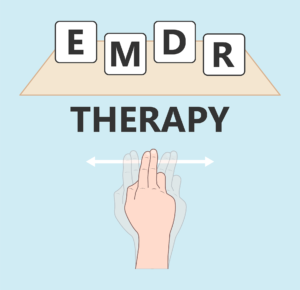What is EMDR Therapy?
Eye Movement Desensitization and Reprocessing (EMDR) therapy is an integrative psychotherapy approach that has been extensively researched and proven effective for the treatment of trauma.
When we experience trauma (or difficult experiences), our brain does not store the memory correctly. Our brain is not able to make sense of what happened and why. Instead, all the information that goes along with that experience – the thoughts, feelings, and body reactions – are stored in an unresolved memory.
The problem with an unresolved memory is that our minds are not able to feel settled. When new things happen to us, that feels similar to the unresolved material, they can trigger all that old confusion. When this happens, old thoughts, feelings, and body reactions rise up again. We feel now and react now like we did back then.

What is an EMDR session like?
EMDR harnesses the body’s innate healing abilities to address and alleviate distressing memories. Following a comprehensive assessment and the creation of a tailored treatment plan, you will be asked targeted questions about a specific troubling memory. The therapist will then guide you through a series of eye movements, which mimic those of REM sleep, by moving their finger back and forth in your visual field. Alternatively, a bar of moving lights, headphones, or a handheld vibrating device may be used to achieve the same effect. These eye movements occur in short bursts, after which you will share your experiences and any changes in thoughts, images, and feelings with the therapist.
With successive sets of eye movements, the intensity of the memory often diminishes, transforming it into a neutral recollection of a past event. This process can also facilitate the healing of related memories, leading to significant and rapid improvements across various aspects of your life.
Throughout EMDR treatment, you remain fully in control, alert, and awake. You can halt the process at any time. The therapist’s role is to support and facilitate your self-healing, intervening minimally. Reprocessing is typically experienced as a spontaneous occurrence, with new insights and connections emerging naturally from within. Consequently, many find EMDR to be a profoundly empowering and natural therapeutic approach.
